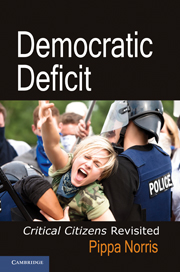Book contents
- Frontmatter
- Contents
- List of Tables
- List of Figures
- Preface and Acknowledgments
- PART I INTRODUCTION
- PART II SYMPTOMS
- 4 Trends in the United States and Western Europe
- 5 Comparing Political Support around the World
- 6 Trends in Democratic Deficits
- PART III DIAGNOSIS
- PART IV PROGNOSIS
- 12 Conclusions and Implications
- Technical Appendix A Concepts and Measures
- Technical Appendix B Countries in the Pooled World Values Survey, 1981–2007
- Technical Appendix C Methods
- Notes
- Selected Bibliography
- Index
4 - Trends in the United States and Western Europe
Published online by Cambridge University Press: 05 June 2012
- Frontmatter
- Contents
- List of Tables
- List of Figures
- Preface and Acknowledgments
- PART I INTRODUCTION
- PART II SYMPTOMS
- 4 Trends in the United States and Western Europe
- 5 Comparing Political Support around the World
- 6 Trends in Democratic Deficits
- PART III DIAGNOSIS
- PART IV PROGNOSIS
- 12 Conclusions and Implications
- Technical Appendix A Concepts and Measures
- Technical Appendix B Countries in the Pooled World Values Survey, 1981–2007
- Technical Appendix C Methods
- Notes
- Selected Bibliography
- Index
Summary
The assumption that the general public in established democracies has become deeply disillusioned with government and politics is so pervasive today that many accounts jump straight into the discussion of consequences and solutions without questioning the evidence. To understand these claims, Part I summarizes what is known about system support from the previous research literature, where concern about trust and confidence in governing institutions has usually waxed and waned over the years, with scholarly accounts reflecting the impact of contemporary political events, realpolitik, and global waves of democratization. Part II sets out the interpretive framework used for describing and interpreting trends in citizens' orientations, emphasizing the importance of paying close attention to the when, where, and what has changed. This chapter focuses upon comparing established democracies, as the longest and richest time-series survey data is available in these societies. Longitudinal trends are documented in the United States and Western Europe, all affluent societies with extensive historical experience of democracy. Using the Eastonian framework discussed earlier, the chapter first compares developments in the most specific levels of support, including attitudes toward particular government agencies, and then moves upward to consider more diffuse indicators of satisfaction with the general performance of democratic regimes and the strength of core attachments to the nation-state.
The longitudinal evidence available within the United States and Western Europe challenges conventional claims that an inevitable downward spiral of public disenchantment with politics has occurred across all established democracies.
- Type
- Chapter
- Information
- Democratic DeficitCritical Citizens Revisited, pp. 57 - 82Publisher: Cambridge University PressPrint publication year: 2011



